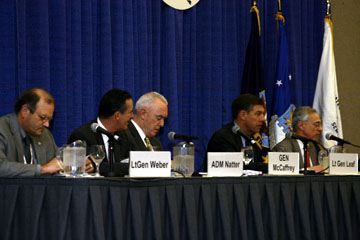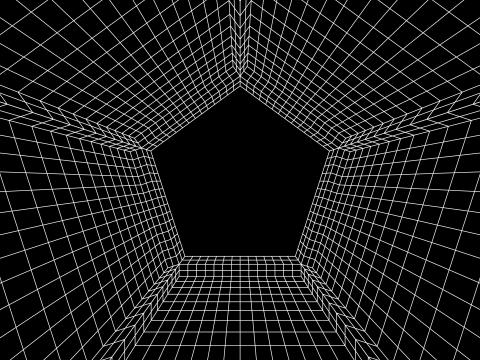 |
| Panelists engaging in a lively discussion on force structure are (l-r) Lt. Gen. Joe Weber, USMC (Ret.); Adm. Robert Natter, USN (Ret.); Gen. Barry McCaffrey, USA (Ret.), Lt. Gen. Daniel Leaf, USAF (Ret.); and panel moderator Col. Jack Jacobs, USA (Ret.). |
The current political picture of looming defense budget cuts poses considerable threats to national security, according to all of the panelists addressing force structure balance at West 2009. They warned against losing valuable advantages against adversaries in the name of economics.
Gen. Barry R. McCaffrey, USA, former commander, U.S. Southern Command, dominated the morning discussion at with several impassioned statements that shattered common perceptions. Noting that defense spending constitutes only about 4 percent of the U.S. gross domestic product, Gen. McCaffrey declared that the United States is not spending too much on the military-it's spending too little.
Gen. McCaffrey decried suggestions that the United States could cut its nuclear deterrent drastically. He warned that "we walk away from our nuclear deterrent at our own peril," and he predicted that massive strategic cuts could trigger nuclear proliferation among 30 nations.
He also addressed generals and admirals, telling them that it is not their role to cut the budget. Instead, they should address the national security threat and leave it to Congress to fulfill its role under Article 1 of the Constitution to raise and support a military, "and they're not doing their job," he said of Congress.
"I don't think we can get it right" when it comes to planning force structure, said Lt. Gen. Joe Weber, USMC (Ret.), the former commander of the U.S. Marine Forces Atlantic. Too many variables will render comprehensive plans obsolete before they come to fruition. "We don't need another study that tells us that we need to conduct operations from one end of the spectrum to the other," Gen. Weber added.




Comments